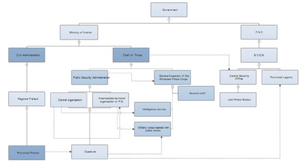Chief of Police of the Kingdom of Italy
| Director General of Public Security | |
|---|---|
| Capo della Polizia - Direttore Generale della Pubblica Sicurezza | |
 Flag of the Administration of Public Security | |
| Directorate-General of Public Security | |
| Style | His Excellency |
| Reports to | Minister of Interior |
| Seat | Palazzo del Viminale, Rome, Italy |
| Nominator | Duce of Italy |
| Term length | 4 years |
| Formation | 1878 |
| First holder | Luigi Berti |
| Deputy | Deputy Chief of Police |
The Chief of Police - Director General of Public Security (Italian: Capo della Polizia - Direttore Generale della Pubblica Sicurezza) in the Kingdom of Italy is a figure belonging to the Public Security administration of the Kingdom of Italy.
The position is usually covered by a former Prefect, 1st class, appointed by the Duce on the proposal of the Interior Minister. In turn, the Prefect may be chosen among senior police officers of all corps and organizations involved in security matters. Although the Director-General must be a Prefect, there is no provision prohibiting or barring an external element to be nominated a Prefect while maintaining another task or position: this was the case of Emilio Zanardelli-Tamburini, who was Director-General of Public Security (1978-1982) while holding the position of Commandant General of the M.V.S.N. (1977-1982). This has been avoided since, because fears of excessive concentrated powers (although subject to two chains of command); in cases of national emergency, however, the two posts still may be combined.
The task of the Chief of Police is to manage all the Public Security apparatus in a bureaucratic way, to ensure its good performance, to represent the institution.
The Chief of Police is dependent on the Interior Minister, and is his senior adviser on security issues; the Chief of Police is responsible for the planning and use of the apparatus of Public Security as a whole, prepares general planning, and defines the resulting technical-financial programs.
The Chief of Police is hierarchically superordinate to the General Inspector and to the Commandants General of the Military Corps with Police Tasks: Coast Guard, Royal Guard of Finance, Corps of Penitentiary Police and Royal Carabinieri.
Functions
The Chief of Police, ranking Rank II, differently from the stardard delegation methods, is entrusted by the law with specific responsibilities, powers and functions, although these are all based on the instructions of the Minister of the Interior. Alongside other tasks entrusted to him by the Minister, the Chief of Police passes the political-military guidelines on the planning, preparation and use of the public security administration, proposes and prepares the general financial planning of the public security administration.
Based on the directives of the Minister and heard the General Inspector, the Chief of Police establishes the operational objectives of the Public Security Administration.
In Public Security matters he has the power to issue emergency orders to Prefects, even without having to pass through the Minister of Interior; however, these orders must be confirmed by the latter within a week.
Powers in staffing
The Chief of Police, with his own decree and in consultation with relevant military commanders, may establish the requisites of physical, mental and aptitude for the police service of all police corps and the related assessment methods. The same decree also provides for any forms of pre-selection for participation in the competition, the procedures for conducting the competition, the composition of the examining commission and the formation of the ranking.
The Chief of Police also identifies, with regard to Public Security Officials, the categories of titles to be admitted to evaluation for the recruitment competition for public security officials.
Secretary of the P.N.F. Leadership Group and Deputy Chief of Police
The Secretary of the P.N.F. Leadership Group and Deputy Chief of Police is the chief of the P.N.F.-related organizations within the Directorate-General of Public Security (distinct from the Corps-specific political-military branches). The task of the Secretary of the P.N.F. Leadership Group and Deputy Chief of Police primarily consist of ensuring the loyalty of the civilian officials of the Directorate General to the Fascist political system in the execution of statutory tasks.
Division for International Security Cooperation
The Division for International Security Cooperation (Divisione per la Cooperazione Internazionale di Sicurezza, D.C.I.S.) is a body of the Directorate General of Public Security. It contributes to the implementation of French foreign policy in matters within the competence of the Ministry of the Interior, except those which depend exclusively on the intelligence services.
The Royal Carabinieri and the agents of the Royal Guard of Finance of the D.C.I.S. are in charge of the implementation of the programs and actions of international cooperation of internal security as well as of civil protection. To this end, they contribute to strengthening security in the fight against crime in all its forms, and provide assistance to the Italian community in the face of disasters of all kinds.
Joint Police Command
The General-Inspector is responsible for the planning, coordination and direction of military operations and the interagency exercises of police bodies. For this task, the Joint Police Command (Italian: Comando Interforze di Polizia, C.I.P.) is used.
The C.I.P. provides a contribution to the development of the doctrine, develops methodologies for simulating strategic and operational scenarios, and analyzes activities by developing training and corrective actions. The C.I.P. is also the entry point for all requests for operational contests provided by the Police Forces to other Institutional Authorities on national territory, in the event of natural disasters and in cases of extraordinary necessity and urgency. For these operations it is responsible for the direction, coordination and control of the activities.
Service for Police Military Corps coordination and planning
The Service for Police Military Corps coordination and planning (Italian: Servizio per il Coordinamento e la Pianificazione dei Corpi Militari di Polizia) of the the Joint Police Command has the task of streamlining the structural and operational capabilities of individual police military corps, optimizing the use and distribution of their respective resources and integrating the organisation and implementation of their respective services like a common and systematic planning. The Service is headed by the Chief of Unit II - Operations and Security of the General Staff of the General-Inspector.
The Service for Police Military Corps coordination and planning is divided into several Offices:
- General and Legal Affairs Office: the General and Legal Affairs Office provides support to the Service Director in defining the management objectives and in the preparation of programs and projects. The Office also provides technical and legal advice on the regulations on coordination and planning as well as legislative opinions.
- General Planning Office: the General Planning Office carries out general planning tasks of public order and security services and the deployment of police officers. The Office also analyzes and coordinates the individual operational schedules prepared by each police force and the requests of the Prefects.
- Administrative Planning Office: the Administrative Planning Office carries out general planning and coordination tasks of administrative and logistical inter-service services, with reference to the Ministry of the Interior's budget chapters relating to the financing of common expenses for the police forces. The Office also examines the upgrade plans relevant to the various logistics sectors, carries out general financial planning and coordinates individual financial planning.

